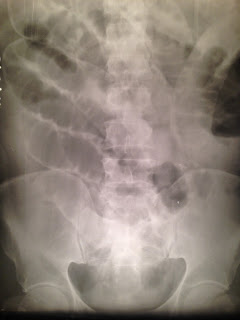Warning: medical post with an unhappy ending. Also, statistics. (eeek!)
Recently we had a patient who had a heart attack. Actually, that's quite common - we often have several in a week. Absent good reasons not to, we typically treat with streptokinase. Streptokinase (SK) is an enzyme made by some bacteria (see if you can guess which!) that has an impressive ability to dissolve blood clots. This makes it useful to dissolve blockages, say, in one of the heart's own arteries (aha! a heart attack). Miracle, no?
Well, it's not specific to the coronary arteries, so it can cause blood clots to dissolve everywhere in the body. There's a constant balance in your body between the clot-dissolving system (which keeps your blood vessels from solidifying) and your clotting system (which keeps you from bleeding from every pore). SK massively shifts the balance in favor of clot-dissolving. You can imagine some of the other risks, but the most serious risk is intracranial hemorrhage (a huge, bleeding stroke, often lethal, always horrifically destructive).
The generic risk of dying from a heart attack is roughly 12%. The risk of intracranial hemorrhage from SK is approximately 0.5%. Giving SK reduces risk of death by about 4%. To put that in easier terms:
For every 200 patients I give SK to...
175 patients will receive SK who would've lived anyway. though I like to think they'll have less heart damage.
8 will live who would have died.
16 will die anyway, despite SK, and...
1 will die who might otherwise have lived.
Well. The patient I began with was the one.
Sometimes you know who it is you saved. In August, and again in September, I had two patients in cardiogenic shock whom I nursed through the night until the SK had its effect and the heart started working again. Other times you just don't know and you have to trust the statistics that say you've done some invisible good. But you always know which ones your treatment harmed.
 |
| Streptokinase. Credit: Wikipedia |
Well, it's not specific to the coronary arteries, so it can cause blood clots to dissolve everywhere in the body. There's a constant balance in your body between the clot-dissolving system (which keeps your blood vessels from solidifying) and your clotting system (which keeps you from bleeding from every pore). SK massively shifts the balance in favor of clot-dissolving. You can imagine some of the other risks, but the most serious risk is intracranial hemorrhage (a huge, bleeding stroke, often lethal, always horrifically destructive).
The generic risk of dying from a heart attack is roughly 12%. The risk of intracranial hemorrhage from SK is approximately 0.5%. Giving SK reduces risk of death by about 4%. To put that in easier terms:
For every 200 patients I give SK to...
175 patients will receive SK who would've lived anyway. though I like to think they'll have less heart damage.
8 will live who would have died.
16 will die anyway, despite SK, and...
1 will die who might otherwise have lived.
Well. The patient I began with was the one.
Sometimes you know who it is you saved. In August, and again in September, I had two patients in cardiogenic shock whom I nursed through the night until the SK had its effect and the heart started working again. Other times you just don't know and you have to trust the statistics that say you've done some invisible good. But you always know which ones your treatment harmed.

















































